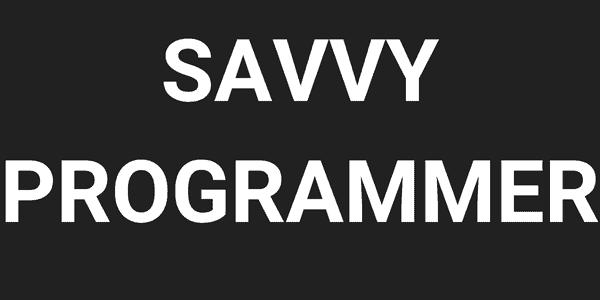Did you know that the demand for software engineers has DOUBLED since 2020?
It’s a job that’s massively in demand, but this creates competition. In my opinion, it’s one of the hardest industries to break into as there are so many talented software engineers out there.
The landscape has also changed over the last year or so with the rise in AI technologies worrying a lot of us. That’s why today, I’m going to teach you how to stand out as a software engineer.
Keep on reading, and I’ll introduce you to the 7 concepts you need to make a splash in this industry:
- Master the fundamentals
- Being a Jack of All Trades
- The ability to code is not enough
- Learning from Masters
- Having a good portfolio of projects
- Making Open-source contributions
- Actively Participate in Code Review

#1 Master the fundamentals
Every software engineer should start by building a base of fundamentals. These are the core skills and programming concepts that never change. You use them throughout your work and it helps you find new opportunities.
My first tip is to set some time aside to study and solidify core programming concepts. The exact ones you pick might vary depending on what you’re specializing in. Through my experience, I find the best concepts to learn are:
- Object Oriented Programming
- SOLID Principles
- Data Structures & Algorithms
Learning the fundamentals lays the foundations for years of success as a software engineer.
Instead of dedicating all of your time to a specific coding framework, you understand the structure behind how things work. Mastering the fundamentals means you can spot patterns and easily switch between frameworks with an understanding of them all.
In other words, it stops you from pigeonholing yourself to one specific job for the rest of your career.
The key is knowing how to master the fundamentals.
Thankfully, we live in a world full of free and paid online resources. Consider signing up for Coursera certifications and doing online courses that teach these fundamentals.
You’ll also find plenty of books out there that are well worth reading. A couple of my personal favorites include:
- Introduction to Algorithms – A great book to learn the basics of algorithms and how to apply them
- Clean Architecture – An essential read for software engineers on some of the basic universal rules to follow
Do whatever you can to learn the fundamentals and make them stick in your brain!
#2 Being a Jack of All Trades
I learned the hard way that mastering one skill is not the way forward in software engineering.
The most successful software engineers stand out because they have diverse skill sets.
You need to be a Jack of All Trades – develop your skills across the whole scope of software engineering rather than focusing on one element and trying to be the “best” at it.
Think about all the different domains of technology development you can dip your fingers into:
- DevOps
- Database engineering
- Cloud frameworks
- Cybersecurity
The list goes on, but it’s YOUR job to learn more about them. Start asking questions and getting your hands dirty.
Developing more skills is easiest when working for a startup company as you’re exposed to all parts of the software development process.
This is because startups work on tighter budgets and like to hire software engineers to do everything. It’s a fantastic way of learning new skills and exposing yourself to the different areas of software development.
How can you get good startup opportunities?
According to The Muse, some of the best ways to find these job/internship opportunities are by:
- Networking online via LinkedIn
- Attending start-up events
- Searching for start-ups on crowdfunding websites and contacting them directly
It’s all about getting your foot in the door. Find an internship or job where you’re forced to step outside your comfort zone and be a Jack of All Trades.

#3 The ability to code is not enough
I’ll admit, it feels weird saying this but your programming/technical skills are not enough to make you stand out.
The best software engineers are incredible team players with skills outside of coding.
According to a report by MyGreatLearning, some of the most valuable software engineering skills employers look for are:
- Great communication
- Terrific teamwork
- Attention to detail
- Problem-solving skills
- Time management
- Multitasking
Develop and improve all of these skills to get ahead of the competition.
You must mold yourself into the dream team player. Be good at communicating with others and collaborating on projects. You should be open to new ideas while also being able to dish out and handle constructive feedback.
It sounds crazy, but even something as simple as good email communication is essential here!
The only way to improve these skills is to force yourself into team projects where you must collaborate.
Again, internships are perfect for this. Look online for software engineering placements where you have a chance to work as part of a team.
This will give you some added experience while teaching you the importance of working together with others. Some other tips I find useful for developing interpersonal skills are:
- Always be open to new ideas and don’t get stuck in your ways
- When writing emails, use bullet points to clearly convey any key points
- Pay attention at all times and make notes so you’re always up-to-date on what’s going on
- Be empathetic to other team members
- Seek out feedback and constructive criticism to improve
#4 Learning from Masters
There’s a fantastic quote by Issac Newton that’s highly relevant to this point:
“If I have seen further, it is by standing on the shoulders of giants”.
He is basically saying that getting help from others will help you go further in life. Specifically, help from knowledgeable experts.
As a software engineer, you’re graced with loads of potential mentors that will help you see further and achieve great things. Try to find a mentor or two who can speak to you, look at your work, and provide feedback.
I’ve had decent success seeking out mentors on the following platforms:
- YouTube – search for software engineer videos and find an expert that produces great content. From here, you can try to message them via their channel or join a community server on Discord. Ask for tips or help and see if they’re interested in being an unofficial mentor of sorts.
- LinkedIn – it’s easy to find seasoned software engineers on this platform, and you can message them with a few simple questions. A lot of experts might not reply, but some could give you great feedback and be open to regular conversations.
- Reddit – join different subreddits dedicated to software engineering/software development. Here, you have access to a community of potential mentors and can pick their brains. If you’re interested, there’s a good article here with a list of the best programming subreddits.
- Meetup – a slightly different platform, but great at finding people. This site lets you find events in your area or online where you can meet others and talk about software development.
Always be humble and receptive to feedback when being mentored.
You’re talking to experts – value what they have to say and don’t take criticism personally or you won’t benefit from their unique insights.
#5 Having a good portfolio of projects
Look for emerging technologies or common languages/frameworks and spend time getting good at them. Take on some side projects at the same time, so you can slowly build a portfolio that shows off all of your skills.
A diverse portfolio demonstrates your abilities as a software engineer and helps you find more work.
Platforms like GitHub are perfect for documenting and sharing your projects. It’s a popular place for developers so you can show what you’re capable of. I’d also say having your own website is critical – it lets you show off your portfolio while also making it easier for potential employers/clients to find you.
If you want to get started building a portfolio project, here are the steps I usually go through:
- Choose a project that means something to you and can show off certain skills
- Set the goals and requirements of this project – what you hope to achieve
- Plan and design the project before you start coding – this also showcases your ability to design software architecture and understand data structures/frameworks
- Write clean code that’s easy for people to read
- Always test your code multiple times
- Document every stage of your project for all to see
- Publish your project on GitHub or your own website

#6 Making Open-Source contributions
Open-source projects give you endless opportunities to showcase skills and learn new things.
All software engineers should contribute to open-source projects as often as possible!
Some of the contributions you can make include:
- Fixing bugs
- Enhancing features
- Documentation updates
- Adding new features
- Bolstering security
You hone your skills while also getting some networking opportunities. Find open-source communities or forums to collaborate with like-minded developers and share ideas & knowledge.
Going back to the mentor point, this is another way to find someone willing to take you under their wing!
Of course, the secret is finding valuable open-source projects to contribute to.
Personally, I find these sites are the best at uncovering open-source opportunities:
#7 Actively participate in Code Review
Finally, you should make an effort to participate in Code Review as often as possible.
Code Review involves looking at other people’s coding and offering feedback to improve the overall quality. It’s a core part of software development that ensures everyone’s coding is up to scratch.
For you, it’s a chance to hone more of your skills and make professional relationships. Participate in code reviews of your peers and find code to review online.
Freelance sites like Upwork or Fiverr are great places to look for Code Review opportunities. Some of the open-source sites I mentioned earlier can also present Code Review chances.
Get feedback on your own code to enhance your coding skills even more.
Don’t forget to get others to review your code and actively ask for feedback. You will learn so much from this. It helps you improve your attention to detail and pick up new skills that’ll improve all future projects.
Stand out as a software engineer today!
If you want to stand out as a software engineer, start implementing these strategies in your career today! They’ll help you get the edge you need over other coders, jumpstarting a successful career and thrusting you to the top.




